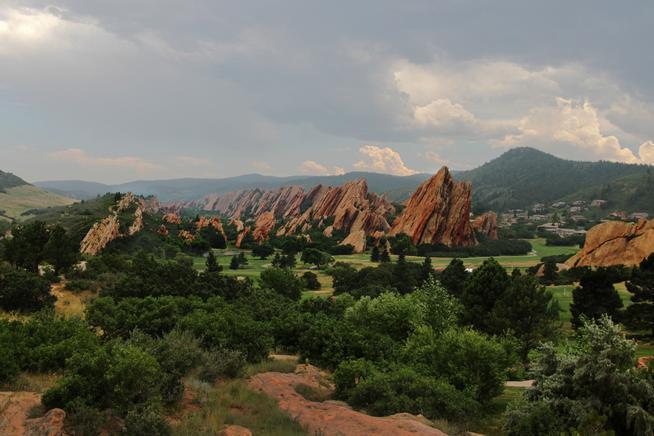Colorado is peppered with 42 state parks that offer a wealth of activities among spectacular backdrops of natural beauty. Often overshadowed by the state’s four national parks — including Rocky Mountain National Park, the third-most visited national park in the country — these parks beckon not only with scenic hiking trails and campgrounds under shady forest canopies, but conditions that are perfect for other outdoor pursuits.
Whether you’re a geology geek, paddleboarder or rock climber, there’s a state park for you. We’ve chosen 10, highlighting a pair of activities for each. It’s just a sampling of what the state has to offer, but a great place to start exploring.
Pearl Lake State Park
Good for: Paddleboarders, kayakers, canoers
Thirty miles north of Steamboat Springs, Pearl Lake is a serene getaway set in a quiet mountain valley below often-snow-capped Farwell Mountain. Though small — it’s just 170 acres — this park is noted for water sports on the calm 105-acre lake where boats are not allowed to create wakes. No wonder paddleboarders love it — particularly the boat ramp cove that’s protected from thewind.
Kayakers and canoers especially enjoy paddling in the early morning when mist may still hover above the lake and the rising sun lights up the forest of blue spruce, lodgepole pine and subalpine fir. You’ll want to make a loop around the lake to see different parts of the shoreline. If you’re hoping to catch cutthroat trout from your kayak, a good place to cast is in the deeper water by the dam. However you’re paddling you may spot foxes, muskrats, deer and myriad birds, such as great blue herons and western tanagers.
You can rent paddleboards, kayaks or canoes at the park from Paddleboard Adventure Co.

Roxborough State Park
Good For: Geology and history buffs
A landscape of dramatic, red sandstone monoliths and spires formed some 300 million years ago attracts geology geeks to Roxborough State Park. One of the oldest outcrops is the FountainFormation with the rocky slabs jutting up at a 60-degree angle. Their red color results from the iron content in the clay that’s holding the sand together. Not quite as old as the Fountain, the Lyons Formation — which is lighter in color due to the amount of quartz — developed from ancient sand dunes (that once covered the West) becoming fossilized. A good hiking loop to access views for both formations is the moderate, 2.5-mile Fountain Valley Trail.
History buffs will enjoy seeing the two-story Persse Place, which you pass on the Fountain Valley Trail. This is a restored local-stone home that was built around 1903. Now, it is an interpretive center that’s open the first Sunday of each month from May to October. Photos of area homesteaders, period furnishings and other memorabilia shine light on the life of the area’s early pioneers.
If you go
A daily parks pass costs $9-$11 per vehicle. A basic annual parks pass costs $80 (discounts for seniors and multiple-car households). Check out each state park’s web page for vital information, including entry fees (possible discounts for entering by bicycle or on foot); facilities for camping or your boat; fishing restrictions; accommodation options (tent camping, RV spots, cabins, yurts); trail maps; bird lists; fire restrictions; and a wealth of other details that will allow you to make the most of your visit. Learn more about the state park system at cpw.state.co.us.
Eleven Mile State Park
Good For: Anglers, kayakers, canoers
Eleven Mile State Park is defined by its 3,400-acre reservoir that’s rimmed by rock outcrops and wetlands, with an expanse high-altitude plains beyond. No matter where you gaze, you’ll have grand views of the Collegiate Peaks. If you’re an angler, you’ll be more than satisfied with the fishing all over Eleven Mile Reservoir, whether by boat or along the shoreline. No matter where you cast from, you can snag trout (rainbow, cutthroat, brown) — sometimes quite large — as well as pike and kokanee.
Kayakers and canoers are enamored with the reservoir for its clear water, sheltered coves and uncrowded conditions, as well as the stellar mountain views. Because of the cool water temperatures (even in summer) as well as sudden winds and large waves, especially in the afternoon, it’s best to wear a life jacket at all times. You can rent a boat, kayak or canoe, or sign up for a guided fishing trip, from 11 Mile Sports at the marina on the north side of the park.

Eldorado Canyon State Park
Good For: Rock climbers and wildlife fans
Eldorado Canyon State Park is a magnet for local climbers as well as climbers from across the country and around the world. They come to tackle the hundreds of technical routes along sandstone cliffs that rise up to 700 feet. This is a place for traditional, or trad, climbing routes, where you use your own removable gear. Skillful climbers will want to check out the Naked Edge, an iconic, 5.11 technical climb with significant exposure, a chimney, finger cracks and other intriguing features. Novice climbers should sign up with one of the guide companies operating in the park, such as Colorado Mountain School.
If you’re keen on spotting wildlife, hike any of the park’s trails in the early morning or toward dusk and you may spy small mammals, such as Abert’s squirrels with their distinctive tufted ears and black fur. Take binoculars. If you’re lucky and sharp-eyed, you may see mule deer, elk, black bear or even an elusive mountain lion. Keep an eye out for prairie rattlesnakes. (For the safety of all the creatures and yourself, keep plenty of space between you and them.) Near dusk, bats — seven species have been found in the park — might be spotted flying overhead (though be aware that the park closes at sunset).

Mueller State Park
Good For: Equestrians and mountain bikers
Whether you’re in the saddle of a mountain bike or a horse, Pikes Peak, Mount Ouray and Pahlone Peak all provide stunning views in 5,000-acre Mueller State Park. The park is studded with aspen, blue spruce and pine (ponderosa and bristlecone) trees and has a network of more than 44 miles of trails for hikers, bikers and horse riders. Horse riders gravitate to Mueller for many reasons, including the fact that it’s home to an equestrian facility that accommodates a dozen or so trailers. Check out the Livery Trail that wanders through the less-traveled southern section of the park to the placid, cattail-rimmed School Pond.
Don’t expect technical mountain bike routes here. After all, the well-worn trails at Mueller are remnants of the days of mining and ranching. But the doubletrack trials are ideal for novice to intermediate bikers. (Remember, though, that cycling at 9,000 feet above sea level can be a challenge in itself, and trails that drop away from parking areas will mean a climb back to your vehicle.) If you pedal along the Cahill Pond Trail to Buffalo Rock, you’ll be treated to views of the historic Cahill homestead, as well as a calm pond and meadows lined with aspen.

Rifle Falls State Park
Good For: Waterfalls enthusiasts and casual cave explorers
Rifle Falls is Colorado’s smallest state park — barely 50 acres — yet it has a well-earned reputation for its stunning waterfalls. Visitors are enamored with the triple cascades, each dropping about 70 feet over a moss-covered limestone cliff. To observe the falls from different angles — and to see them close up — hike the Coyote Trail along the right side of the falls. This trail also gives you access to several small limestone caves that will especially delight young hikers.
The caves formed from dripping water that dissolved the calcium in the limestone cliffs, depositing this mineral, over thousands of years, in myriad shapes along the ceilings, walls and floors. The cave openings range from mere slits to broad entrances that beckon the curious to explore. Most are quite shallow, but one stretches 50 feet. Climbing to the top of the falls provides a spectacular vantage point of the cascade and access to a cave that offers a stellar view from behind the waterfalls.

Jackson Lake State Park
Good For: Stargazers and bird watchers
Jackson Lake State Park is one of the best venues in Colorado for stargazing. Last year it became the state park system’s only official International Dark Sky site. Both expert and amateur astronomers gravitate here, where the calm lake reflects the glow of the stars in the tranquil night. For clear views, set up your telescope either in the marina parking area or, if you’re camping, in the Northview campground. In summer you’ll spot the constellations of Andromeda, Virgo and Scorpius and other celestial objects. When the park offers a public program, visitors can gaze through a sophisticated Celestron telescope.
Birders flock to the park year-round. Two great bird watching venues include the reservoir’s dam and the 1.5-mile Prairie Wetlands Trail. In the summer and early fall, aside from American white pelicans, you might see double-crested cormorants spreading their wings to dry their plumage as they stand on the shores of Jackson Lake. Overhead, you may spy a red-tailed hawk soaring.
Lory State Park
Good For: Mountain bikers and wildflower fans
Criss-crossed with 21 miles of trails to delight mountain bikers, Lory State Park has something for every skill level. (Most of the routes allow bikers to share the trail with equestrians and hikers.) A popular intermediate/advanced mountain biking loop combines the Timber, Howard and West Valley trails for almost 9 miles of exhilarating singletrack. You’ll pedal on tight switchbacks, climbing steeply through pine forest, and then tackle a challenging descent. The Corral Center Mountain Bike Park will also appeal to thrill-seekers with its dirt jumps and a circuit of banked turns. Novices can also tackle the Bike Park, where there is a section that allows them to hone their skills.
For wildflower fans, the specimens are most prodigious in May and June, though blossoms can still be found in July. On the Well Gulch Nature Trail, hikers will get a good workout as they revel in shooting stars and lupines, while wild sunflowers and colorful bee balm may be admired along the Mill Creek Trail. Wandering through meadows and pine forest, the roughly 3-mile (roundtrip) Arthur’s Rock Trail is home to dozens of species of wildflowers, including columbines, and prairie coneflowers.

Arkansas Headwaters Recreation Area
Good For: River rafters and anglers
Unlike most state parks, Arkansas Headwaters Recreation Area is a linear park that stretches 152 miles, from Leadville to Lake Pueblo along the Arkansas River. This is a stunner of a location featuring some of the nation’s most popular whitewater rafting. Depending on your location as well as the water level, the thrill factor varies greatly, though it’s at its peak in summer. Typically you’ll find Class II to Class III in Brown’s Canyon and Lower Bighorn, Class III to Class IV in The Numbers and Royal Gorge, and Class V in Pine Creek.
Anglers will also delight in this river that offers Gold Medal waters with abundant sites where you can fish either from a boat or from the banks. Whether you drop your line in a deep pool or an eddy, you might catch brown and rainbow trout, which can reach up to 18 inches.
Less-experienced boaters without their own equipment can sign up with an outfitter, such as Arkansas River Tours. Anglers hoping for tips may contact a guide service, such as ArkAnglers orUpRiver Fly Fishing.
Ridgway State Park
Good For: Paddleboarders and Fly Fishermen
This roughly 3,000-acre park, about 20 minutes from Ouray, is surrounded by the ragged peaks of the Cimarrons and the San Juans. Locals and visitors alike enjoy paddleboarding on Ridgway State Park‘s 5-mile-long reservoir while relishing the stunning mountain scenery. The park rents paddleboards, kayaks and canoes at Dallas Creek or near the beach in Dutch Charlie. Since the reservoir can get quite crowded, especially later in the day, you may want to hit the water in the early morning when it’s quieter and the water is calm. One especially great spot to paddle is off the Dallas Creek park entrance. Keep your eyes peeled and you may spot deer or foxes on the shore, red-tailed hawks soaring above, or blue herons wading in the water.
The most beloved spots for fly fishing in this park are the pools and plunges in the 1-mile section below the dam on the Uncompahgre River next to Pa-Co-Chu-Puk (known as Paco). Cast for cutthroat and rainbow trout that can average up to 18 inches, as well as brown trout that have been known to reach a hefty 10 pounds.
Credit: Source link






























